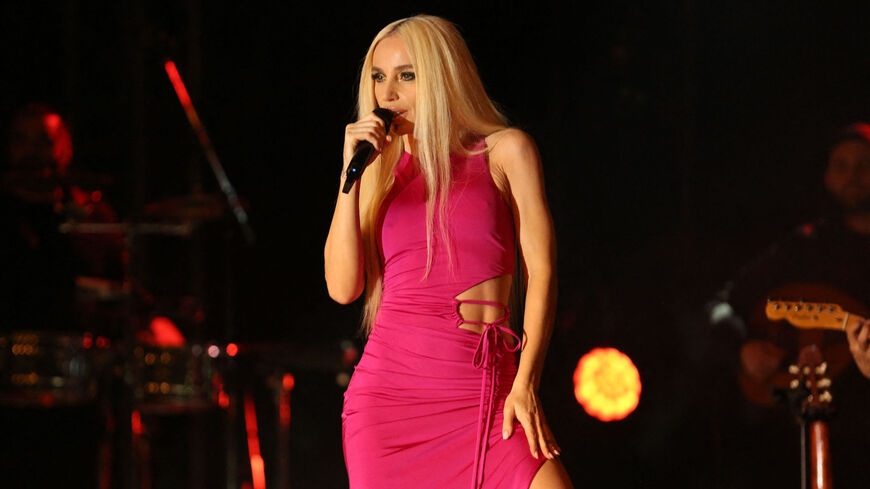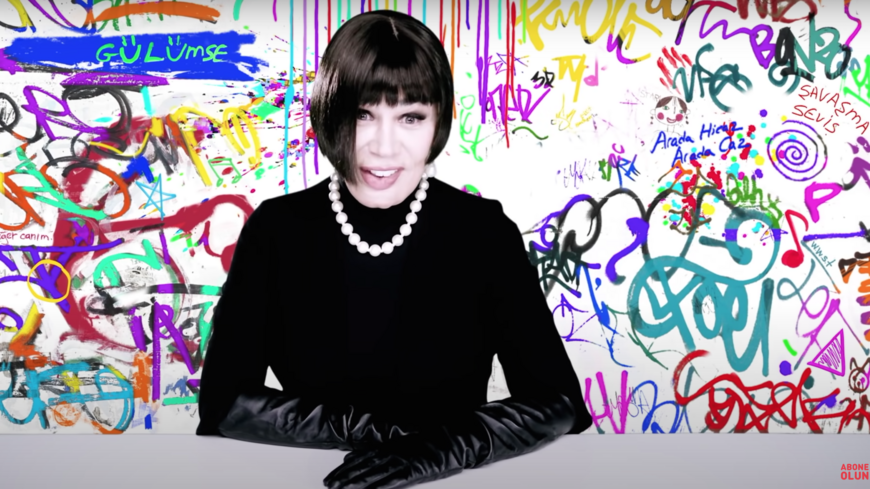Turkey's women, LGBTQ artists top targets of Erdogan's drive for cultural hegemony
From pop stars to performers, Turkey’s secular arts scene faces increasing pressure under Erdogan’s conservative push.

During nearly 23 years at the helm, Turkish President Recep Tayyip Erdogan has steadily extended his iron grip over multiple spheres from politics to faith, with one notable exception that he periodically acknowledges in public speeches: cultural life.
“We have not established cultural rule,” Erdogan has repeatedly grumbled to members of his ruling Justice and Development Party (AKP).
Little comes close to encapsulating this averred failure than recent images of a piously garbed young woman with an Islamic headscarf and ankle-length skirt twerking with gusto before a bare-chested male dancer in tight satin pants at a club in the Aegean port city of Izmir.
The pair, who were identified only by their initials H.K. and A.S., were detained last week after footage of their gyrations went viral on social media. The chief prosecutor’s office announced that they were being investigated for openly insulting religious values and indecent behavior.
The arrests come amid an intensified campaign against Turkish performers, filmmakers and others in a panoply of cases ranging from the invidious to the outright bizarre. Take the case of Ayse Barim, a successful talent manager whose trial on charges of seeking to overthrow the government during the countrywide Gezi Park protests in 2013 resumed on Tuesday. In rare good news, Barim was freed and placed under house arrest until her next hearing, scheduled for Feb. 11.
İzmir'de bir gece kulübünde dans eden zenne ile bir kadın, 'Halkın Bir Kesiminin Benimsediği Dini Değerlere Alenen Hakaret ve Müstehcenlik' suçlarından gözaltına alındı. pic.twitter.com/cUd0khGfTa
— Pusholder (@pusholder) September 25, 2025
Jailed in January, Barim initially faced conflict-of-interest charges that stemmed from her dual role in both casting and managing artists, creating what authorities said was an unfair monopoly over the industry. The claims were not baseless but hardly merited putting the 50-year-old cardiac patient behind bars, rights groups say. Many observers speculated that the real reason was her commercial success, squeezing out aspiring competitors who share Erdogan’s prudish, anti-secular worldview. Her alleged refusal to let her clients appear on pro-government talk shows didn’t help. Then came the Gezi accusations, jettisoning Barim into the legal morass that has also entrapped Osman Kavala, the celebrated Turkish philanthropist accused of masterminding the protests.
Kavala has been rotting in prison since 2017, serving a life sentence. His close associate, filmmaker Cigdem Mater, was jailed in 2022 and sentenced to 18 years for a supposedly subversive documentary that she never made. Barim is facing up to 22 years if convicted as charged.
All insist they are innocent. In 2019, the European Court of Human Rights — whose rulings are binding on Turkey — ordered Kavala’s immediate release. Ankara has continued to defy the court on other prisoners of conscience, notably prominent Kurdish politician Selahattin Demirtas, even as it maintains engagement with Abdullah Ocalan, the jailed leader of the outlawed Kurdistan Workers Party, in whose name Demirtas is accused of committing terrorist acts.
The government’s unremitting campaign against its opponents is now centered on the main opposition Republican People's Party, which was founded by modern Turkey’s first leader and Erdogan’s ideological nemesis, Kemal Ataturk. Scores of party officials have been arrested on what the opposition says are baseless corruption charges. They include at least 17 mayors, among them Ekrem Imamoglu, the charismatic mayor of Istanbul and Erdogan’s most credible rival.
The secular-leaning arts world is being targeted in parallel. “Turkey’s artists have long used their platforms to oppose governmental abuses of power. Political satire magazines were around in Ottoman times,” recalled Lisel Hintz, an assistant professor of international relations at Johns Hopkins University’s School of Advanced Studies. As such, the Gezi protests in which many performers participated “marked a monumental public confrontation between the AKP and those who opposed it,” Hintz said.
The current government’s religion and morality narrative is more of a veneer. “These moves are low-cost bones to throw to Islamist and other conservative supporters to show that the AKP is working in their favor,” Hintz told Al-Monitor.
Indeed, going by the steady stream of miniseries featuring scantily clad women engaged in illicit liaisons that draw millions of viewers — and dollars — both at home and abroad, the government is not serious about the clampdown. In contrast, pro-Islamist productions lampooning secularist lifestyles such as "Gassal," a recent television drama about a brooding washer of corpses, and "Cihangir Cumhuriyeti," set in Istanbul’s equivalent of Greenwich Village, have been relative flops.
However, the assault against secular artists is accelerating, in part to deflect attention from what the government’s militant base views as its limp reaction to Israel’s actions in Gaza and general anger over spiraling inflation.
“The government has dropped all the carrots and is wielding a big stick,” Kenan Behzat Sharpe, an assistant professor at Istanbul’s Sabanci University and the author of a forthcoming book on Anatolian rock music, told Al-Monitor.
Last week, authorities ordered the detention of a Turkish show host and a rapper over a joke referencing one of the teachings ascribed to the Prophet Muhammad: "Wine is the mother of all evil." Comedian YouTuber Bogac Soydemir is under investigation for making the joke and his guest, Enes Akgunduz, for having laughed at it.
In July, one of Turkey's oldest satirical magazines, LeMan, stopped publishing after four of its staff were arrested over a cartoon deemed to have insulted Islam. An arrest warrant is pending against its editor-in-chief, Tuncay Akgun, who is now living in exile in France with his wife and fellow cartoonist, Ramize Erer.
At the “front line,” Sharpe contends, are women and LGBTQ individuals.
A longtime target is pop singer Mabel Matiz, who is widely assumed to be gay. Istanbul prosecutors launched a criminal probe this month into obscenity accusations against the singer over the lyrics of his latest hit, “Perperisan,” which roughly translates to “devastated.” In the song, Matiz laments being single and urges a boy to “lie by my side” and to fuse him with “the flavor of the mint gum” that he is chewing. “The devil in me says, ‘Jump on him. Let the bird fly to his nest,'” Matiz says. The Family and Social Services Ministry was so incensed that it sought a court order to block access to the song on the grounds that it potentially harmed public order and general health, while damaging family values and children’s mental health.
Matiz responded via X that he wanted to believe that “our public order and public health are not so fragile as to be undermined by a song.”
The move marked the first time Turkish authorities have demanded the removal of a specific song from a digital platform. However, an unwritten ban on gay characters in films and television series is already in place. “Shows depicting queer romance and sex are no longer produced, largely as a precautionary measure,” Sharpe noted. In November, organizers scrapped an Istanbul film festival in protest of the ban on the screening of “Queer,” starring Daniel Craig, on the grounds that it contained provocative content that would disturb the peace.
The band Manifest is also under investigation, and like Matiz forbidden to leave the country, by a public prosecutor for “indecent and immoral acts” and “exhibitionism” during a Sept. 6 concert in Istanbul. Rolling Stone gave the six women performers a glowing review in May, saying they were “fluent in choreography, femininity and unapologetic edge, standing together in a way that hasn’t been seen in this country in more than a decade."
For Oktay Saral, chief adviser to Erdogan, the girls were “immoral, shameless, demonic creatures” who needed to be prevented via legal means from committing further “exhibitionist acts.”
The pressure worked. The band issued a statement following their interrogation, saying they took full responsibility for the contents of their age-restricted show but that they had meant no harm. They canceled the rest of their Turkey tour, for which tickets had sold out weeks ago. “We thank our fans for their interest and love,” Manifest said via X.






